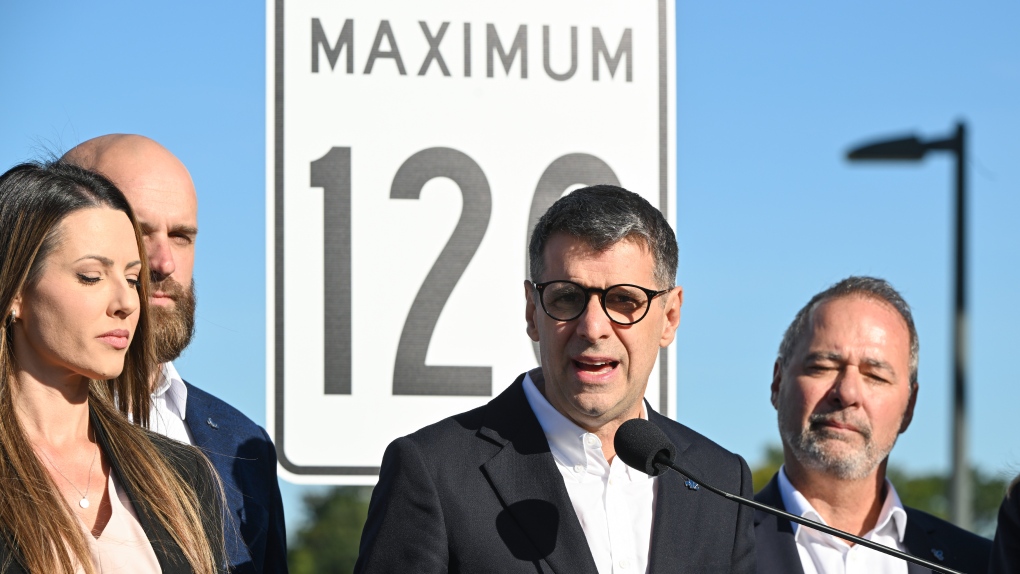Quebec election: Legault won't release study on Quebec City-Levis third-link project
Coalition Avenir Quebec Leader Francois Legault says he won't release a study into the impact of a "third link" crossing the St-Lawrence River from Quebec City to its south shore.
Questions about a third link impact study have dogged Legault on the campaign trail, with opponents attacking him for a lack of transparency.
The National School of Public Administration conducted a study in 2019-2020 on the effects of major projects such as the third link on residential, commercial and industrial development, as well as on the protection of agricultural land.
Legault has previously said a study specifically looking at the $6.5-billion tunnel his party is promising that would connect the downtowns of Quebec City and Levis is ongoing, adding the previous impact assessment isn't directly about the tunnel and doesn't account for increased telework patterns during the COVID-19 pandemic.
He says he's committed to releasing a study on his party's favoured project when it is ready, which is only next year.
On Day 21, Legault's campaign turned his attention to the Lower St-Lawrence region, including a stop in Rimouski, Que., a riding once considered a Parti Quebecois stronghold now up for grabs.
CONSERVATIVES WANT SPEED LIMIT INCREASED
Motorists will be able to drive a little faster on the province's highways if the Conservative Party of Quebec is elected to power on Oct. 3.
Leader Eric Duhaime announced at a news conference Saturday morning in Levis that a Conservative government would increase the speed limit to 120 km/h on highways where conditions permit.
Duhaime said that currently, many motorists exceed the 100 km/h limit, and that it is time to let Quebecers decide if they prefer to drive at 120 km/h rather than 100 km/h.
While driving faster increases a vehicle's fuel consumption - and therefore gasoline costs at the pump - the Conservative leader again said that everyone should have the option to choose whether they are willing to make that sacrifice to save some time on their commute.
"Time is money too," he said. "I think there are people who will appreciate saving a little 5-10 minutes, or 20 minutes to get to Montreal, with an extra 10-15 km per hour."
 Quebec Conservative Leader Eric Duhaime, flanked by local candidates, proposes to raise the speed limit to 120 km/h on highways, Saturday, Sept. 17, 2022 in Levis Que. Quebecers are going to the polls for a general election on Oct. 3. THE CANADIAN PRESS / Jacques Boissinot
Quebec Conservative Leader Eric Duhaime, flanked by local candidates, proposes to raise the speed limit to 120 km/h on highways, Saturday, Sept. 17, 2022 in Levis Que. Quebecers are going to the polls for a general election on Oct. 3. THE CANADIAN PRESS / Jacques Boissinot
To support his argument, Duhaime relied on two studies, conducted in British Columbia and Germany, where increases in speed limits have not resulted in an increase in accidents, he argued.
The Conservative leader also pointed out that technology and car safety have evolved significantly in recent years, which means that Quebec is ready, in his opinion, to increase the speed limit on highways.
However, Duhaime said the goal of his measure is to allow people who are already driving faster than 100 km/h on highways, because of a police tolerance zone, to do so legally.
He is not proposing that the same tolerance zone be applied to the 120 km/h limit, so that vehicles start driving at 130 or 140 km/h.
"If it's 120 km/h for everyone, I think it will clear the air for all Quebec citizens, and at least we'll be able to have a line that won't be left to the discretion of the police," he said.
This report by The Canadian Press was first published in French on Sept. 17, 2022.
CTVNews.ca Top Stories

Canadian team told Trump's tariffs unavoidable right now, but solutions on the table in surprise Mar-a-Lago meeting
During a surprise dinner at Mar-a-Lago, representatives of the federal government were told U.S. tariffs from the incoming Donald Trump administration cannot be avoided in the immediate term, two government sources tell CTV News.
Pedestrian killed by Via Rail train near Kingston, Ont.
Regular rail traffic has resumed with severe delays.
Muskoka reacts to major snowfall, hundreds stuck on Highway 11
From road closures, power outages, weather declarations and nonstop shovelling, Muskoka residents were faced with nearly a metre of persistent snowfall on Saturday.
Saskatoon priest accused of sexual assault says he meant to encourage young girl with hug and kiss
A Saskatoon priest accused of sexual assault says he meant to encourage and reassure a young girl when he hugged and kissed during his testimony at Saskatoon Provincial Court Friday.
Beef prices reach record highs in Canada
The cost of beef continues to rise, reaching record highs on grocery store shelves ahead of the busiest time for many grocers and butchers before the holiday season.
Trump threatens 100% tariff on the BRIC bloc of nations if they act to undermine U.S. dollar
U.S. president-elect Donald Trump on Saturday threatened 100 per cent tariffs against a bloc of nine nations if they act to undermine the U.S. dollar.
Bob Bryar, drummer for rock band My Chemical Romance, dead at 44
Bob Bryar, former drummer for the band My Chemical Romance, has died. He was reportedly 44.
Toronto man accused of posing as surgeon, giving four women injections
A 29-year-old Toronto man has been charged after allegedly posing as a surgeon and providing cosmetic procedures on several women.
'Disappointing': Toronto speed camera cut down less than 24 hours after being reinstalled
A Toronto speed camera notorious for issuing tens of thousands of tickets to drivers has been cut down again less than 24 hours after it was reinstalled.


































